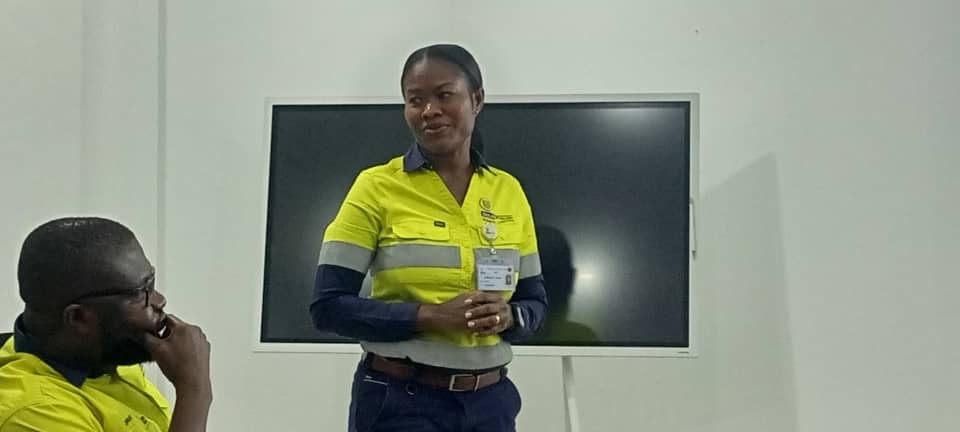Accra, Oct. 1, GNA – AngloGold Ashanti Iduapriem Mine and Gold Fields Ghana Limited, leading players in Ghana’s mining industry, have bemoaned the growing threats of illegal mining activities on their investments and operations.
The two companies said the increasing activities of illegal miners on their concessions called for a collective action to protect their operations, vital assets and environment.
The companies are also alarmed about the pollution of water bodies closed to their concessions and called for stricter law enforcement and clearer communication about their contributions to national development.
The concerns came to light when members of the Journalists for Business Advocacy visited the mines during a media engagement organized with the Ghana Chamber of Mines.
Acting Managing Director of AngloGold Ashanti Iduapriem Mine, Abraham Osei Badu, highlighted the negative effects of illegal mining activities, particularly the contamination of local water sources.
“One of the main issues is the contamination of streams around the mine’s concession. We have always kept our streams clean, but unfortunately, some of them are being tampered with from sources far from our operations, leading to contamination that eventually flows through our concession,” Mr Osei Badu explained.
He said the contamination was having severe consequences on local communities that relied on these water bodies for farming and domestic use.
“Imagine someone using contaminated water to spray vegetables; it creates a health risk for the entire community. This is why we strongly oppose illegal mining activities.”
Mr Osei Badu highlited illegal miners encroaching on restricted areas of the mine and stealing valuable equipment crucial to operations.
On her part, the Mine Manager, Tarkwa Mine, Catherine Kuupol Kuutor, described illegal mining activities as a worrying trend.

She also expressed anxieties about the encroachment in communities closer to their assets, adding “ it’s a big challenge to the mine.”
Ms Kuutor said management was exploiting ways to keep the encroachers off, adding that the Tarkwa Mine relied on government and the Ghana Chamber of Mines for protection.
“We are actually struggling with approaches and Gold Fields Tarkwa Mine is no exception. But, we’re trying as much as possible to ensure that we co -exist peacefully within the community, and, if we need to shout, we will shout at the right time to get the necessary support from the regulators to protect the mines.”
Ms Kuutor said the mine had no right to cede any concession, unused lands or areas and explained, such issues were backed by the regulations.
She highlighted safety of the mine workers, especially from people intruding on the mine concession without any knowledge as there were no enough buffer zones for co-existence.
On corporate social responsibility, Mr Stephen Adjei, Senior Manager of Sustainability at AngloGold Ashanti Iduapriem Mine, reiterated company’s commitment to corporate social responsibility (CSR).
He said the company had invested in the local economy, particularly in health, education, water, sanitation, agriculture, and youth development.
Over the years, the company has increased its community development spending from $250,000 to $4 million. “Everything we do is aimed at empowering people and advancing society.
Educating the youth allows them to contribute meaningfully to the progress of their communities,” Adjei noted. Director of External Relations and Communication at the Ghana Chamber of Mines, Ahmed Nantogmah, said illegal mining was negatively impacting the regulated and responsible mining sector.
He urged the government to strengthen enforcement against galamsey activities, particularly those that threaten water bodies and mining concessions.
Mr Nantogmah emphasized that responsible mining companies adhered to strict Environmental, Social, and Governance (ESG) standards while illegal miners flouted environmental regulations.
“The narrative in the media often focuses on the negative aspects of mining, showing images of illegal mining activities when responsible miners are following the law and making significant efforts to mitigate environmental impacts,” he said.
Mr Nantogmah also called for better protection for legitimate mining companies, which he said play a critical role in Ghana’s economy by contributing through taxes, royalties, and employment.
Mr Nantogmah called for transparency in the government use of mineral royalties, arguing that the lack of visible community benefits often fuelled negative perceptions of mining.
“When people say they don’t see the benefits of mining, it’s often because they are unaware of how the revenues are being used. We believe the government should provide more transparency in how these funds are spent,” he added.
GNA